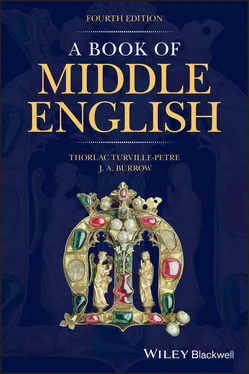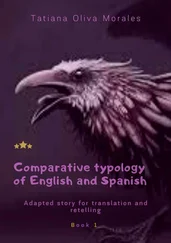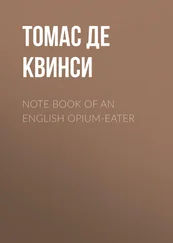8.4.3 Some Nouns and Verbs
Many of the words examined above are adjectives, which are particularly prone to semantic change, because they take on the colour of the nouns they qualify. Nouns to pay attention to are, for example, mete , ‘food’ (7b/51, 9/45, 474); daunger , primarily ‘power’, but with senses ranging from ‘reserve’ (17/384) to ‘state of longing’ (10/250); sentence , basically ‘opinion’, but with senses including ‘decision, judgement’ (16/530), ‘teaching’ (16/35), ‘subject matter’ (18b/111), and ‘meaning’ (16/126); wit , ranging in sense from ‘wisdom’ (8/129), ‘intelligence’ (12/55), ‘advice’ (7b/55), to ‘mind, thought’ (8/74). Among verbs, bowe commonly means ‘go, come’, lymp is not ‘limp’ but ‘happen’ (8/265), sterve not ‘starve’ but ‘die’ (16/420). Thynk means ‘seem’, not ‘think’ which is thenk ; it is most often used in impersonal constructions: me thynkes , ‘it seems to me’ (11/259). For more impersonal verbs, such as like and list , see 5.6.8. If in any doubt about the signification of a word, the advice must be to check the footnote, look in the glossary, and for a fuller appreciation of semantic range and connotations, follow it up in OED and MED .
Some common idioms and syntactic features that should be noted may be followed up in chapter 5, including the indefinite pronoun man / mon / me (5.4.3), gan / con used with an infinitive verb to express a past tense (5.6.3), the simple present and past tenses where today we would use progressive ‘is / was + ‐ing’ (5.6.1 ‐ 5.6.2), word‐order in that clauses (5.9.4). It is often tricky to capture the sense of the subjunctive mood, since it is so much more widely used in Middle English than today; examples of appropriate translations are given in 5.6.6.
Because translation is never an exact process, it may be helpful to supply a commentary to explain why choices have been made, what the alternatives would be, and what cannot be expressed in a word‐for‐word translation. The translation will draw on the information of relevant dictionaries, of a Middle English grammar such as the introduction to this book or grammars listed in the Bibliography (9.2), and of the annotations in a reliable edition of the text. The commentary should acknowledge these sources, noting points of interest or difficulty in the text, and should relate the passage to the wider context of the work. Here is a proposed translation together with a brief commentary of a passage from Trevisa’s Dialogue (12.44–57):
Clericus :
Ȝe cunneþ speke and rede and understonde Latyn. Þanne hyt nedeþ noʒt to have such an Englysch translacion.
Dominus :
Y denye þys argument; for þey I cunne speke and rede and understonde Latyn, þer ys moche Latyn in þeus bokes of cronyks þat y can noʒt understonde, noþer þou wiþoute studyinge and avysement and lokyng of oþer bokes. Also, þey hyt were noʒt neodful vor me, hyt is neodfol vor oþere men þat understondeþ no Latyn.
Clericus :
Men þat understondeþ no Latyn may lerne and understonde.
Dominus :
Noʒt alle: for som may noʒt vor oþer maner bysynes, som vor elde, som vor defaute of wyt, som vor defaute of katel oþer of frendes to vynde ham to scole, and som vor oþere dyvers defautes and lettes.
Clerk :
You’re able to speak and read and understand Latin. So then it isn’t necessary to have an English translation.
Lord :
I deny this argument; for though I’m able to speak and read and understand Latin, there’s much Latin in these chronicle books that I can’t understand, and nor can you without studying and consultation and reading other books. Also, though it mightn’t be necessary for me , it is necessary for other people who understand no Latin.
Clerk :
People who understand no Latin may learn and understand.
Lord :
Not everyone: for some aren’t able to because of other sorts of activity, some because of old age, some for lack of intelligence, some for lack of funds or of relatives to provide for them to go to school, and some for other various defects and hindrances.
This is a representation of conversational language, though of a rather formal sort, so that colloquial reductions such as ‘isn’t’ may be appropriate in a translation. However, the Clerk addresses the Lord with the deferential plural ʒe , while the Lord replies with þou (see 5.4.1). There is no way of conveying this distinction in a Modern English translation, with the result that a significant feature of social register is lost. Trevisa writes in a South Western dialect, with spellings such as þeus , ‘these’, vor , ‘for’, and the form ham for ‘them’.
nedeþ , ‘is necessary’, is used as an impersonal verb (5.6.8). The Lord discourses at length on the notion of necessity (ll. 59–69). In early use katel means ‘property, wealth’. Livestock was one form of property, and OED gives a detailed account of the social factors that resulted in the sense‐development to ‘cattle’. In this context frendes probably has the sense ‘relatives’ rather than ‘friends’, though either is certainly possible here. In ON frændi means ‘relative’, and this sense was borrowed in Middle English ( MED frend 4). vynde is ‘provide for, support’. In this dialect initial is often voiced to . This sense of find , quite common in this period, is today restricted to the phrase ‘all found’, meaning ‘with everything provided’. See OED find , senses 7–18.
The questions that Trevisa raises about a translation, what is its point and who is it for, are particularly pertinent when translating verse: should the translation be ‘in ryme oþer yn prose’? Here is a literal rendering of the first twelve lines of one of the most affecting religious lyrics, an address by the sinner to the infant Christ (text 14l). To modernize this as a sung lullaby, preserving its poetic form, would be a challenging task, but it would highlight how much is lost in the prose translation. Whereas Trevisa writes in a Western dialect, John of Grimestone’s lyrics are in the language of Norfolk, as described in the Headnote.
Lullay, lullay litel child, child, reste þe a þrowe.
Fro heyʒe hider art þu sent with us to wone lowe;
Pore an litel art þu mad, unkut an unknowe,
Pine an wo to suffren her for þing þat was þin owe.
Lullay, lullay litel child, sorwe mauth þu make, 5
Þu art sent into þis werd as tu were forsake.
Lullay, lullay litel grom, king of alle þingge.
Wan I þenke of þi methchef, me listet wol litel singge;
But caren I may for sorwe, ʒef love wer in myn herte,
For swiche peines as þu salt driʒen were nevere non so smerte. 10
Lullay, lullay litel child, wel mauth þu criʒe,
For þan þi bodi is bleyk an blak, sone after sal ben driʒe.
Lullay, lullay, little child; child rest yourself a while. From on high you are sent to live here below. You are created poor and little, unrecognized and unknown, to suffer pain and misery for the sake of what was your own. Lullay, lullay, little child, you may well weep; you have been sent into this world as if you have been abandoned.
Lullay, lullay, little lad, king of all things; when I think of your suffering I really have little wish to sing, but I might indeed be sorrowful if love was in my heart, because no pains were so sharp as those you will suffer. Lullay, lullay, little child, well may you cry, for when your body is pale and wan, a little later it will be shrivelled.
Читать дальше












